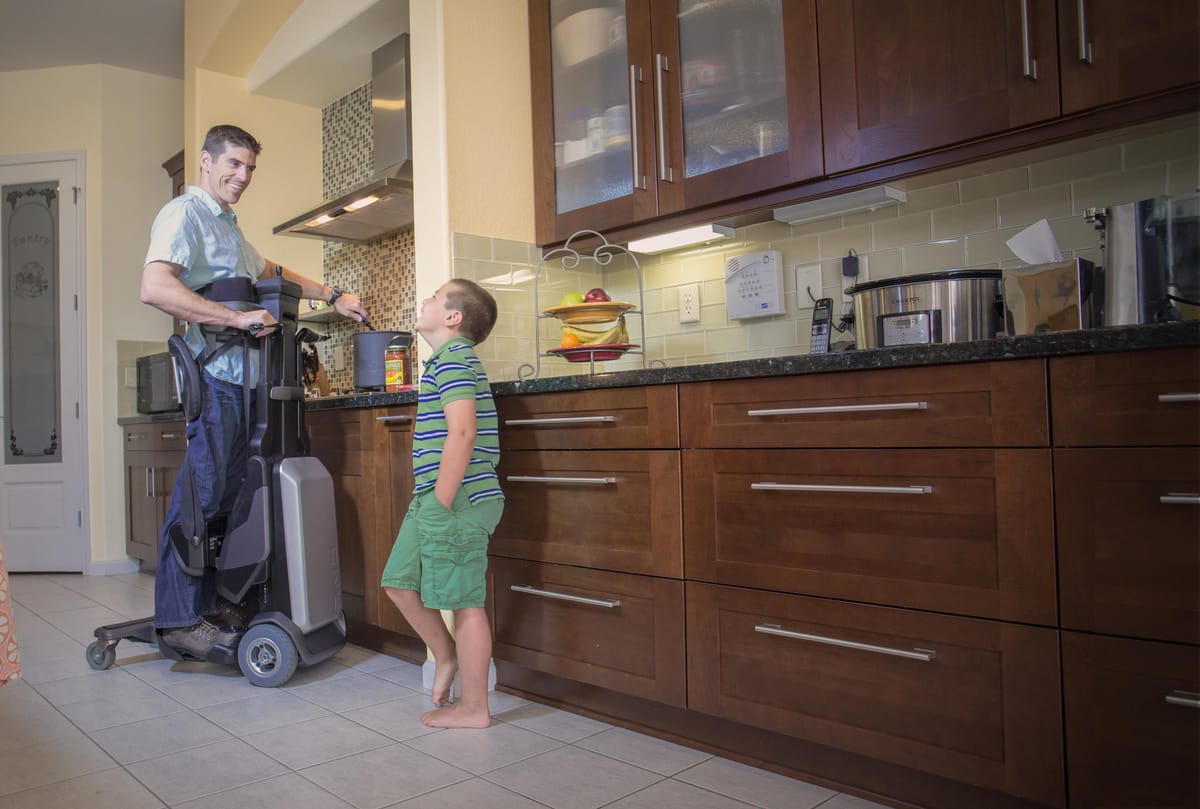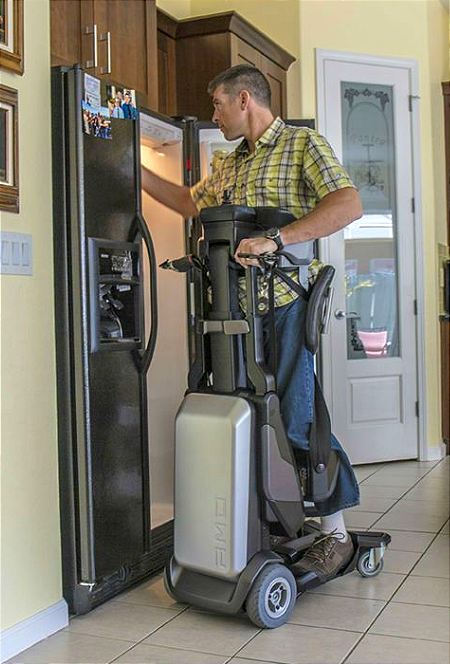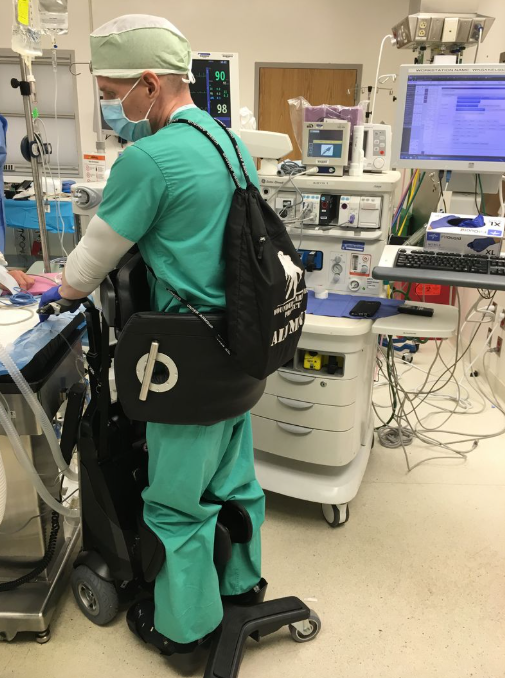

Salt Lake City, Utah — October 23, 2025
The woman rolled into the trade show booth in Leipzig, Germany, her wheelchair wheels squeaking softly against the floor. Eleven years had passed since her spinal cord injury, years spent looking up, always below eye level, always reliant on others. She spoke only German, through a translator, and the doctor accompanying her warned that standing could be risky. But she was determined.
Moments later, strapped into a handmade standing device, she rose. Her face transformed first — from apprehension to radiant, wide-eyed joy. She moved, cautiously at first, then confidently, maneuvering across the booth floor. Watching from across the hall, tech entrepreneur Steven Boal felt the weight of the moment. “Her face said everything,” he recalls. “You could see what standing meant — dignity, independence, humanity.” That brief, powerful scene would shape the next chapter of his career and the lives of hundreds of paraplegics worldwide.

Boal’s journey to this moment was far from linear. A serial entrepreneur, he had built a career turning technology into profitable ventures long before thinking about medical devices. From Drexel Burnham Lambert, to Tristar Market Data, to co-founding Opt Edge, which produced the first wireless handheld trading platform for options, he had proven his ability to innovate at the cutting edge. Later came Coupons.com in 1998 and CashStar, which became the largest electronic gift card company and was ultimately acquired by Blackhawk. By 2012, Boal had seen the lifecycle of startups, from inception to acquisition, and had the business acumen to scale any idea.
Then a short video changed everything. Posted on a tech blog, it showed a hand-built device from Turkey that allowed paraplegics to stand. Unlike exoskeletons, it wasn’t about walking — it was about restoring posture, presence, and agency. Moved by the potential, Boal flew to Berlin with his late partner, meeting the young inventors at a prosthetics trade show in Leipzig.
The first encounter was tense. When Boal offered to purchase the very first production device for the woman, she was angry, misreading the good will gesture as mockery. She had spent her savings just to attend the event and feared he was making fun of her poverty. “We cleared it up,” said Boal, “and she received the first commercial unit. She used it for four years before she passed. Those final four years mattered. That device restored her dignity.”
From that encounter, Matia Mobility was born. The company’s mission: to deliver independence, safety, and mobility to those who had spent years confined to wheelchairs. Every design choice reflected that goal.
Unlike bulky exoskeletons, Matia Mobility's technology is designed for practical independence. It fits in non-ADA spaces, navigating narrow hallways and standard bathrooms. Users operate it via a remote control, lifting themselves from bed to standing without assistance. It allows for toileting independently, a breakthrough for personal privacy and dignity. An optional outdoor kit adds pneumatic wheels for curbs, grass, and uneven terrain, letting users move through normal surroundings.

The device is durable, built like a tank, and lasts well over a decade. Foot measurements, weight, height, and heel design are all customized to the individual, making it a bespoke piece of equipment tailored to each user’s physical needs. Some units even outlast the patient, and when upgrades are needed, Matia Mobility offers replacement and enhancement services. “One of the most important things we hear from users,” Boal said, “is, ‘I don’t want to be spoken down to anymore. I want to be at eye level, living like a person.’ That’s dignity.”
Every unit is assembled in Salt Lake City, Utah, 100% made in the USA and TAA-certified for VA procurement. Matia Mobility employs roughly 40 full-time manufacturing staff and 40 sales representatives, with plans to double the sales team in the coming weeks. “We want this to be a Utah success story,” said Boal. “We first think locally, then globally.”

Insurance remains a challenge. Coverage is expanding, including Blue Cross, Aetna, Cigna, Tricare, and state Medicaid, but the claims process can stretch for six months or more. “Some insurers try to outlast both you and the patient,” Boal lamented. “They send partial payments, claim miscoding, and restart the clock. It’s frustrating, but we do it for the patients every day.”
The financial model balances social impact with business sustainability. Each device costs roughly $30,000 out the door — far less than the $65,000 often needed to retrofit a home for wheelchair access. With a patient-first focus on product delivery, Matia Mobility generates reliable cash flow while remaining mission-driven. The company is raising $5 million to cover working capital while navigating insurance delays, ensuring devices reach patients without interruption. “We don’t need the money to survive,” Boal said. “We need it to keep serving more patients faster.”
The impact goes far beyond economics. Each team member has a personal connection which amplifies the company’s commitment, where it be family members living with walking disabilities or having lost people who might have benefitted from the device. “We’ve all seen what losing independence does to a person,” he says. “And we know how transformative it can be to restore even a small measure of it.
For users, standing isn’t a novelty — it’s a reclaiming of daily life. One patient, a medical student and firefighter, described the device as life-changing, allowing him to participate in operating rooms and labs at eye level. Another stood for the first time in 42 years. “Every time someone stands, it reminds us why we do this,” Boal said. “It’s the most gratifying thing I’ve ever done. Not the most profitable — but the most meaningful.”
Matia Mobility continues to innovate. The company has an active R&D team and looks forward to bringing new productions and innovation to market. Expansion plans include additional staff and a wider distribution network, ensuring devices reach as many people as possible. The company has already shipped hundreds of units globally, with a focus on U.S. patients, but its reach extends to international markets as well.
Boal’s vision is clear: technology should serve humanity, and business can be both profitable and socially responsible. In a market dominated by power wheelchairs worth billions globally, Matia Mobility distinguishes itself not just by design and function, but by the dignity it restores. For the patients who rise from their wheelchairs for the first time in years, that’s the real return on investment.
Learn more at MatiaMobility.com.

